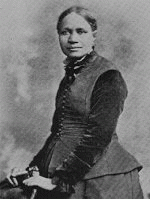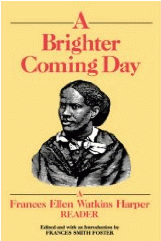Frances Ellen Watkins Harper was a woman I wish I had learned about in grade school. One of the most important women of the 19th century, she was born a free black woman in Baltimore, Maryland, September 24, 1825.
February 22 is the anniversary of her death nearly a century ago, in 1911.
Harper was a revolutionary journalist, poet, author, abolitionist, feminist and lecturer, and was well known during her lifetime. A prolific writer, she has been credited with initiating the tradition of African-American protest poetry.
She was a founder of the American Woman Suffrage Association, a member of the national board of the Women's Christian Temperance Union, executive officer of the Universal Peace Union, and one of the founding members of the National Association of Colored Women, serving as its vice president from 1895 to 1911.
Harper received a classical education at The Academy for Negro Youth, the school run by her uncle. Her studies included Latin, Greek, and the Bible. At the age of fourteen, she went to work as a domestic in a Quaker household, where she was encouraged to explore their library and was supported in her literary aspirations.
Her first volume of verse, Forest Leaves, (also called Autumn Leaves) was published in 1845 when she was 20 years old. Extremely popular, over the next few years the book went through twenty editions.
She attacked racism and the oppression of women in her poetry.
In 1854, her book, Poems on Miscellaneous Subjects, attracted critical notice and became her biggest success. She used her income from this and other books to help free slaves.
In her poem, Bury Me in a Free Land, she said:
I ask no monument, proud and high.
To arrest the gaze of the passers-by;
All that my yearning spirit craves,
Is bury me not in a land of slaves.
She married Fenton Harper in 1860, and their daughter Mary was born in 1862. Their marriage ended with his death in 1864.
After the Civil War ended, she turned her attention to women’s rights. Friends with Susan B. Anthony and Elizabeth Cady Stanton, Harper wrote and lectured on temperance, civil rights, suffrage, and literacy. A popular speaker, she passionately encouraged both black and white audiences to choose to live in integrity. (Note: You can view every article as one long page if you sign up as an Advocate Member, or higher).
Songs for the People
by Frances Ellen Watkins Harper
Let me make the songs for the people,
Songs for the old and young;
Songs to stir like a battle-cry
Wherever they are sung.
Not for the clashing of sabres,
For carnage nor for strife;
But songs to thrill the hearts of men
With more abundant life.







